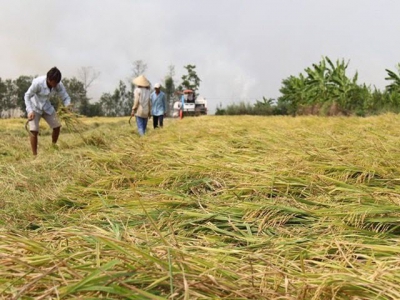Philippines to import 250,000 tons of rice

Farmers harvest rice in the Mekong Delta region - PHOTO: TRUNG CHANH
CANTHO – The National Food Authority of the Philippines has issued an invitation to a tender, expected to take place on October 18, for importing 250,000 tons of 25% broken rice under government-to-private (G2P) contracts, according to the Vietnam Food Association in an announcement to local food traders.
Nguyen Trung Kien, vice chairman and general secretary of the association, has issued Document 410/CV/HHLTVN announcing the Philippines’ tender to encourage local food traders to take part in the tender.
No restrictions have been imposed by the Philippines on the origin of the rice or the types of enterprises permitted to attend the tender. This means both private and State firms are eligible to join the tender, and the deadline for putting their names down to join the tender is October 17.
The Philippines intends to divide the volume of 250,000 tons of 25% broken rice into nine tender packages. The reference price set by the Philippines is US$431.2 per ton, inclusive of the insurance, freight and delivery to the designated warehouses. The payment will be made 30 days after the buyer receives the original legal documents.
Earlier, the Philippines in May opened a tender to import 250,000 tons of rice under G2P contracts, but Vietnamese traders failed to sell any rice to the Philippines, as Thailand offered better prices and won the tender.
However, Vietnam secured a deal on May 4 to supply 130,000 tons of rice to the Philippines at a bidding session, under government-to-government rice contracts.
Data from the Ministry of Agriculture and Rural Development show that outbound Vietnamese rice sales brought in US$2.5 billion for some five million tons of rice over the January-September period, up 8.5% in volume and a whopping 23.2% in value year-on-year. In particular, the rice shipment to the Philippines over the January-August period surged by 67.4% year-on-year.
Related news
 Fruit, veggie exports likely to hit US$3.8 billion
Fruit, veggie exports likely to hit US$3.8 billion Vietnam is projected to earn US$3.1 billion in vegetable and fruit exports in the first nine months of the year, a year-on-year surge of 17.1%.
 Blockchain technology: The 'passport' for agricultural exports to major markets
Blockchain technology: The 'passport' for agricultural exports to major markets A tracing system based on blockchain technology provides consumers with information from production to consumption, all of which is done in real time.
 Coffee exporters count on local market as exports slow
Coffee exporters count on local market as exports slow Vietnamese coffee exporters are seeking opportunities in the domestic market, as they are facing reduced exports due to falling prices.